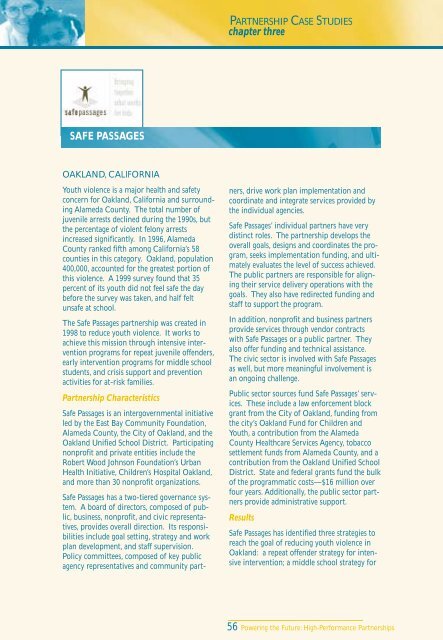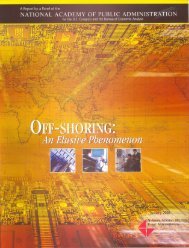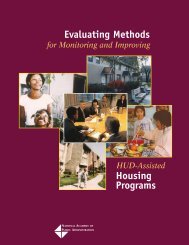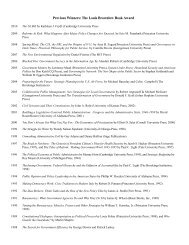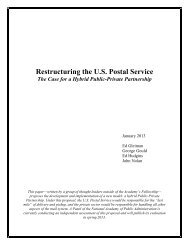High-Performance Partnerships - National Academy of Public ...
High-Performance Partnerships - National Academy of Public ...
High-Performance Partnerships - National Academy of Public ...
Create successful ePaper yourself
Turn your PDF publications into a flip-book with our unique Google optimized e-Paper software.
PARTNERSHIP CASE STUDIES<br />
chapter three<br />
SAFE PASSAGES<br />
OAKLAND, CALIFORNIA<br />
Youth violence is a major health and safety<br />
concern for Oakland, California and surrounding<br />
Alameda County. The total number <strong>of</strong><br />
juvenile arrests declined during the 1990s, but<br />
the percentage <strong>of</strong> violent felony arrests<br />
increased significantly. In 1996, Alameda<br />
County ranked fifth among California’s 58<br />
counties in this category. Oakland, population<br />
400,000, accounted for the greatest portion <strong>of</strong><br />
this violence. A 1999 survey found that 35<br />
percent <strong>of</strong> its youth did not feel safe the day<br />
before the survey was taken, and half felt<br />
unsafe at school.<br />
The Safe Passages partnership was created in<br />
1998 to reduce youth violence. It works to<br />
achieve this mission through intensive intervention<br />
programs for repeat juvenile <strong>of</strong>fenders,<br />
early intervention programs for middle school<br />
students, and crisis support and prevention<br />
activities for at-risk families.<br />
Partnership Characteristics<br />
Safe Passages is an intergovernmental initiative<br />
led by the East Bay Community Foundation,<br />
Alameda County, the City <strong>of</strong> Oakland, and the<br />
Oakland Unified School District. Participating<br />
nonpr<strong>of</strong>it and private entities include the<br />
Robert Wood Johnson Foundation’s Urban<br />
Health Initiative, Children’s Hospital Oakland,<br />
and more than 30 nonpr<strong>of</strong>it organizations.<br />
Safe Passages has a two-tiered governance system.<br />
A board <strong>of</strong> directors, composed <strong>of</strong> public,<br />
business, nonpr<strong>of</strong>it, and civic representatives,<br />
provides overall direction. Its responsibilities<br />
include goal setting, strategy and work<br />
plan development, and staff supervision.<br />
Policy committees, composed <strong>of</strong> key public<br />
agency representatives and community part-<br />
ners, drive work plan implementation and<br />
coordinate and integrate services provided by<br />
the individual agencies.<br />
Safe Passages’ individual partners have very<br />
distinct roles. The partnership develops the<br />
overall goals, designs and coordinates the program,<br />
seeks implementation funding, and ultimately<br />
evaluates the level <strong>of</strong> success achieved.<br />
The public partners are responsible for aligning<br />
their service delivery operations with the<br />
goals. They also have redirected funding and<br />
staff to support the program.<br />
In addition, nonpr<strong>of</strong>it and business partners<br />
provide services through vendor contracts<br />
with Safe Passages or a public partner. They<br />
also <strong>of</strong>fer funding and technical assistance.<br />
The civic sector is involved with Safe Passages<br />
as well, but more meaningful involvement is<br />
an ongoing challenge.<br />
<strong>Public</strong> sector sources fund Safe Passages’ services.<br />
These include a law enforcement block<br />
grant from the City <strong>of</strong> Oakland, funding from<br />
the city’s Oakland Fund for Children and<br />
Youth, a contribution from the Alameda<br />
County Healthcare Services Agency, tobacco<br />
settlement funds from Alameda County, and a<br />
contribution from the Oakland Unified School<br />
District. State and federal grants fund the bulk<br />
<strong>of</strong> the programmatic costs—$16 million over<br />
four years. Additionally, the public sector partners<br />
provide administrative support.<br />
Results<br />
Safe Passages has identified three strategies to<br />
reach the goal <strong>of</strong> reducing youth violence in<br />
Oakland: a repeat <strong>of</strong>fender strategy for intensive<br />
intervention; a middle school strategy for<br />
56 Powering the Future: <strong>High</strong>-<strong>Performance</strong> <strong>Partnerships</strong>


